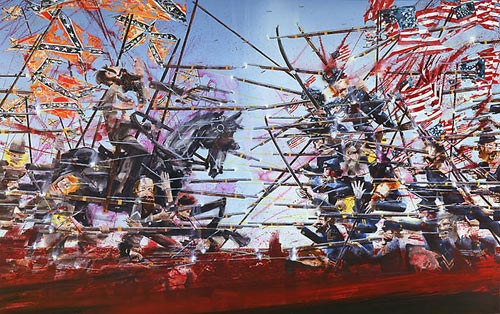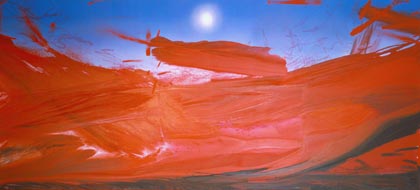I love this painting by Barnaby Furnas but I doubt Meg would let me hang it anywhere in the house. Perhaps if we had a dungeon.

Furnas has done several paintings in this style, including one I saw at the Whitney in aught-four.
Barnaby Furnas’ “flood” paintings are quite impressive in person…check them out at the Boesky Gallery in Chelsea through Oct 18. Their sheer size and the degree to which their creation must have been out of the artist’s control is intriguing.
The web site for the Marianne Boesky Gallery is a bit behind the times, so it doesn’t yet have the information for Barnaby Furnas’ upcoming show of his work from September 15 to October 14. The show will include his recent “flood” paintings; here’s a representative piece from the Saatchi Gallery:

Furnas’ huge flood paintings are created using a technique called “the pour”, detailed in a New Yorker article from earlier this year:
Furnas started at the high end of the canvas, not pouring but slathering on water-based Mars Black with sweeps of a wide brush. He switched to a dark red, laying it down quickly, and sometimes flinging it out in Pollock-like arcs. Sarah and Jared went into action with plastic spritz bottles, spraying water on the paint to make it spread and flow down the inclined plane. Boesky, equipped with a bottle of her own, followed their lead. The canvas began to look like a river of blood, dark and murky at the bottom, shading to a brighter and more lurid red in the middle. It was happening very fast, and changing from one second to the next-streaks of different red combining and separating, and running down to the lower end, where they dripped off the canvas into pails and other receptacles. After fifteen minutes, the whole midsection of the canvas was covered.
His Hamburger Hill piece at the 2004 Whitney Biennial was one of my favorites there, so I’ll definitely be checking out this new show.







Stay Connected